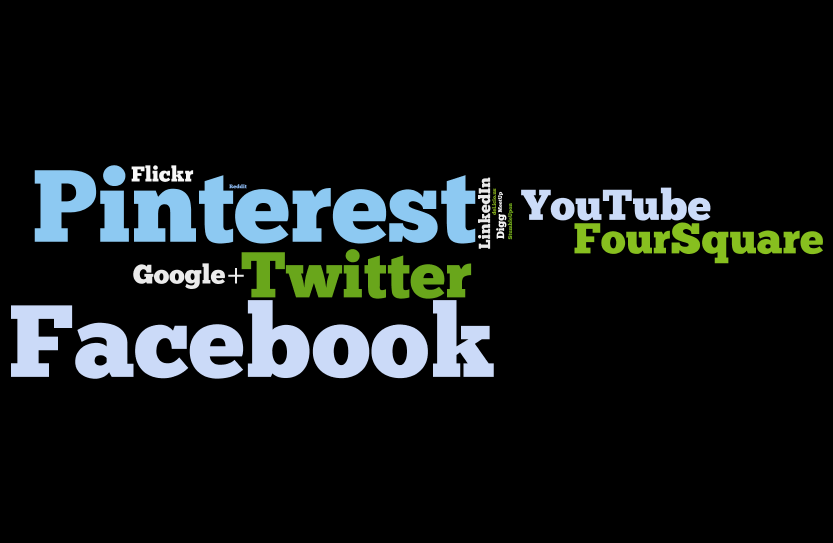As a relatively new element of marketing, social media represents a bit of a quandary for marketers, namely trying to answer the question “How much social media do I need for my business?”
Asking the question in the first place is actually a very important first step, as statistics show that there are still businesses that do not utilize any form of social media as part of their marketing efforts. Part of the problem comes from trying to figure out what role social media should play. Many marketers are in a state of near-paralysis regarding social media, as they don’t know where to start and are overwhelmed with the amount of information that exists telling them what they should be doing.
Facebook? Twitter? YouTube? Pinterest? LinkedIn? Tumblr?
All of the above, and more, have been promoted as “essential” social media platforms for businesses, with many somewhat vague and generic online articles written by so-called social media “experts” that utilize fear tactics to suggest that avoiding Pinterest or Tumblr or any of the other current “hot” social media platforms, is tantamount to signing your business’ death warrant.
A Step Back: What Is the Role of Social Media?
A lot of this hysteria is being caused by relative novices to the business world who have amassed a good deal of social media expertise in a very short period of time, and who do not have a broader base of experience when it comes to marketing as a discipline that takes time and experience to understand. In the past, a relative newcomer with limited experience mostly likely would not have dared to write an article suggesting how to use television, magazines, or out-of-home to create a marketing campaign. The intricacies of putting together a plan utilizing this media types are complex and require years of experience to develop and nurture.
However, the democratization caused by social media has created a veritable litany of “social media experts” who claim their title based almost solely on their use of social media in their personal lives. With its perceived “low cost of entry” to engage in social media, people are confusing personal uses of, for example, Facebook, with business use and making very generic statements regarding how, and even why, social media should be part of the marketing mix.
This type of misinformation is actually counterproductive, as it results in businesses that attempt to put a social media plan in place based on the wrong criteria (“we need a Pinterest page”) or the wrong goals (“we need to achieve 5,000 ‘Likes’ in two weeks”). Statements such as these are too broad in their implications, and do not really address the underlying issues of how these social media tactics, not an objective) are solving an overall marketing objective.
What Social Media Is Good At… and What It’s Not
When utilizing social media, we need to understand its strengths. Social media promotes two-way conversations with your consumers, so you can learn from them and use that learning to transform your product or service offerings.
It’s also great for helping amplify your communications messaging via creating conversations. To do so, you need to know why your consumers might want to talk about the idea, how to get them involved, and how to keep the conversations going once they’ve become engaged.
Oftentimes, these strengths are go unnoticed by overzealous marketers who are looking to immediately generate buzz and develop communities in order to create brand evangelists in order to affect their sales. Those are long-term goals that need to come a long time after the initial stages of listening, participating, and facilitating sharing of content.
So, How Much Social Media Do You Need?
Where does that leave us? Ultimately, how much social media is the right amount? Should it be 100%? Should it be 15%, as stated in this article by Social Media Agency, Simply Zesty?
The true answer is neither.
Social media is not a solution to your marketing woes. By itself, with no other support, it’s not going to double your store traffic, increase your sales, or improve your low brand awareness. As noted in Social Media Today’s article, “Three Little-Known Social Media Misconceptions That Can Destroy Your Marketing Strategy,” social media is a slow building process that is not intended for fast, easy, direct conversions. Social media is about trust and relationships, and those take a long time to pay off.
As firmly as our belief that social media should never be 100% of your marketing strategy, we also do not subscribe to assigning arbitrary percentages, such as the 15% number quoted by Simply Zesty.
Our Two Cents
We look at it this way: a marketing plan is like a golf bag being carried onto the course by a professional golfer (a marketer). No matter how good the golfer is, and how much he thinks he knows about the game, there’s no way that he would ever go onto the course with a golf bag container only a putter and nothing else. He might have the best putter in the entire world, but without a few drivers in the bag, it’s going to take him forever to get to the green, and he’s going to be passed up by all of the other golfers on the course.
Only the professional, based on his experience with the game, can decide how many clubs (marketing tools, such as advertising, PR, promotions, etc.) he needs and when, and how often, to use them to achieve the best results.
Comments are closed.



